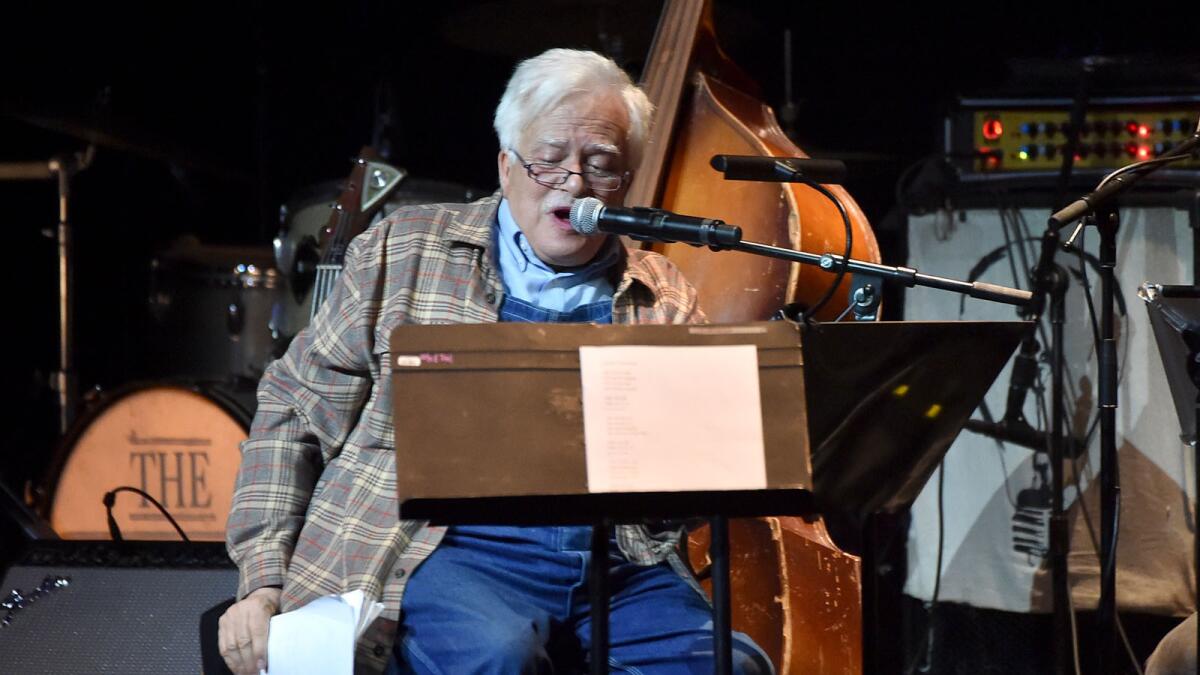Van Dyke Parks gives his ‘final performance’ on the piano

Van Dyke Parks performs onstage during The David Lynch Foundation’s DLF Live Celebration at The Theatre at Ace Hotel on April 7, 2015.
- Share via
This past weekend, Van Dyke Parks gave what he called his “final performances at the piano” with a pair of shows at Largo at the Coronet, surveying his nearly 50-year career as a composer, arranger, record executive and all-around raconteur on the L.A. music scene.
Parks was born Jan. 3, 1943, in Hattiesburg, Miss., raised in Lake Charles, La., and first came to Southern California as a child actor, appearing with Grace Kelly in “The Swan” in 1956.
As a gifted child singer and clarinetist, he once sang for Albert Einstein at Princeton, and as a boy he landed a performance with the Metropolitan Opera in New York in 1953. After relocating to Los Angeles in the early 1960s, Parks also famously became Brian Wilson’s collaborator on the Beach Boys’ “Smile” album, which was shelved for 37 years. With Parks’ help, Wilson finally completed and released “Smile” in 2004 to considerable acclaim.
Parks’ farewell performances featured guest appearances by singer Gaby Moreno, songwriter-producer Joe Henry, Grizzly Bear’s Edward Droste, New Zealand singer-songwriter Kimbra and jazz guitarist-composer Grant Geissman, among others.
Monty Python’s Eric Idle also was on hand and was one of “a lot of old friends” in attendance, including former Warner Bros. Records Chief Executive Mo Ostin and the label’s former talent development exec Lenny Waronker. Among other credits, Parks and Waronker co-produced the 1968 debut album by Randy Newman, who also was on hand Friday at Largo.
“There’s never been anybody like him, harmonically, in pop music,” Newman told The Times on Monday. “He goes places that nobody goes. People go there, and then they can’t get out of the places they get themselves into.
“[Composer Arnold] Schoenberg said in his harmony book, ‘If you’re on the 5th floor of a building, you don’t get to the ground floor by jumping out of a window’ — the way Oasis used to do, like the Beatles could. Van Dyke always does it so gracefully.”
Calendar caught up with Parks, who has lived in South Pasadena in recent years, to discuss the close of this chapter in his long career.
Why are you giving up public performance at the piano? Randy Newman saw Friday’s show and told us, “I don’t get it. He can still play better than anybody else.”
I had unsuccessful hand surgery last year, and all it takes is about 40 minutes — just when it matters — for a hand to freeze. Rather than go out decrepit, I’m taking Randy Newman’s advice when he sang, “I have nothing to say, but I’m going to say it anyway.” Knowing when to quit is the moral to that song, and I do think that is important.
There have been so many facets to your musical life — are you quitting music completely?
I still have Granados and Albeniz [sheet music] on my piano easel at my granddad’s Steinway that’s been in our family for 100 years. This creates a vacuum in my life because the piano has been my secret life for these many years. So I hope that can still happen at home. ... I’m also spending some time with students hither and thither — nothing great, doing some teaching out of CalArts [in Valencia]. It’s nice to be around another generation and watch them open doors we forgot were there.
What about conducting, arranging, orchestrating and composing?
I did something that was important [at the Largo shows]: I previewed my intention for my next project, which is to set poetry to music, to underscore poems. So I will still be performing once I get that done. I will be looking to find a celebrated string quartet to take things to an irreducible minimum. I can pick up a quartet in Peoria, or in Europe, to perform something like this. I also hope to find a film project that interests me, and if I have to escape from being a pariah in my own town, that’s what I’ll do.
How did you choose the songs for this swan song performance?
I did a litany of everything I’ve almost learned through the years. Gaby sang a song called “The Immigrant” by David Rudder, the only Calypsonian who uses his real name. The song flies right in the face of the people who are against it. Kimbra, who was jet-lagged coming in from New Zealand, came on her own dime and did “He Needs Me,” by my old friend Harry Nilsson.
How did the plaudits from so many of your collaborators, admirers and fans in the house register with you?
It was a very wonderful affair. I got all the attention I didn’t deserve.
Follow @RandyLewis2 on Twitter. For more classic rock, join us on Facebook
More to Read
The biggest entertainment stories
Get our big stories about Hollywood, film, television, music, arts, culture and more right in your inbox as soon as they publish.
You may occasionally receive promotional content from the Los Angeles Times.











